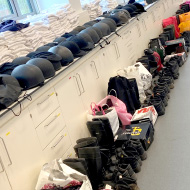
The Royal (Dick) School of Veterinary Studies held a clothing yard sale.
Veterinary students graduating from the University of Edinburgh have donated hundreds of items of personal protective equipment (PPE) to schools and charities across the city.
Riding hats, waterproofs, boots, wellies and lab coats are among the items bestowed by the leaving students, along with items left by graduating students from previous cohorts.
Between May and August this year, more than 100 black bags of items were collected by a small team of staff at the school, led by staff members Emma Boyd, Heather Scott and Sharon Potter. The team wanted to ensure that nothing went to waste and that items of PPE were either recycled, donated or sold to support local charities and schools.
Many of the items were sold at a PPE yard sale for current students in aid of homelessness charity All for Paws, run by staff and students from the Royal (Dick) School of Veterinary Studies. All4Paws provides free treatment and advice for pets belonging to the vulnerably housed and homeless people in Edinburgh.
Other items were distributed across Edinburgh and overseas and, owing to the tremendous success of the project, the team now hopes to make the yard sale an annual event.
Emma Boyd, exotic animal teaching facility supervisor and project coordinator, said: “We couldn’t believe how much clothing and equipment we managed to collect.
“I’m so pleased that we were able to pass some items onto schools and charities and sell the rest of students to help raise money for such a deserving charity like All4Paws. They offer a vital service to our local community and they deserve every penny.”
Image (C) Royal (Dick) School of Veterinary Studies.



 The Veterinary Medicines Directorate (VMD) is inviting applications from veterinary students to attend a one-week extramural studies (EMS) placement in July 2026.
The Veterinary Medicines Directorate (VMD) is inviting applications from veterinary students to attend a one-week extramural studies (EMS) placement in July 2026.